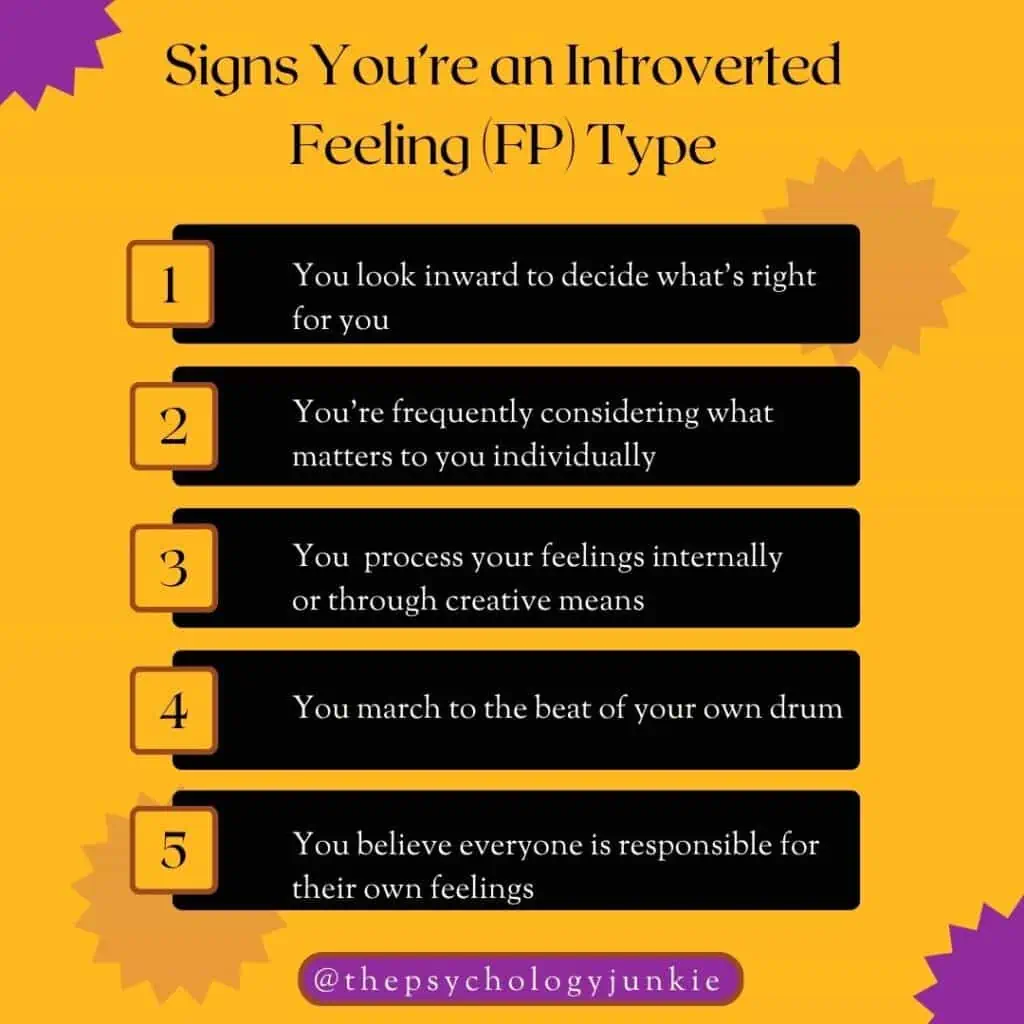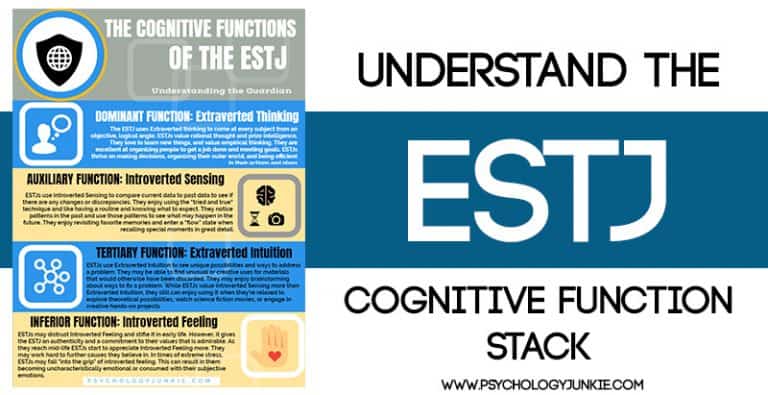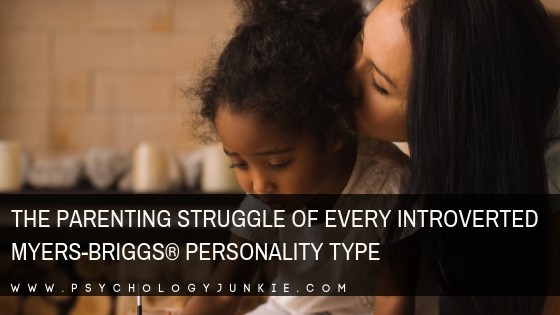10 Signs You Might Be an Introverted Feeling Type
What is Introverted Feeling, or Fi? When it comes to understanding yourself, knowing how your mind works can be invaluable. As an INFP, ISFP, ENFP, or ESFP, you use a process called Introverted Feeling, or Fi, when you make decisions. If you’re an ISTJ, INTJ, ESTJ, or ENTJ, you also use Introverted Feeling, but only after information has been analyzed via Extraverted Thinking.
So what is Introverted Feeling? How can you be sure you use it? That’s what we’ll explore in today’s post!

What Is Introverted Feeling?
Introverted feeling is a judging function. This means that it is what FPs (ISFPs, ESFPs, INFPs, ENFPs) use when they decide. Whenever you use Introverted Feeling to decide you tap into what matters to you on an individual level. You’ll consider your ethics, morals, emotions, desires, and what simply feels right in your gut. For you, internal harmony matters more than external harmony or demands. You need to feel right about what you’re doing, even if it means marching to the beat of your own drum.
10 Signs You Might Be an Introverted Feeler
#1 – Authenticity Is Extremely Important to You
You are determined to be “real” and honest in the way you live your life and interact with other people. Phony social niceties and small talk drive you crazy. When you spot insincerity from other people it’s an instant turn-off.
#2 – You Get Gut Feelings Pretty Quickly That Something is Right or Wrong
You don’t always know where these feelings are coming from, but you get a strong “intuitive” hunch when something is out of line with your ethics and values. You become anxious and might even feel sick if you do something that goes against your values.
#3 – You’re Private About Your Emotions
Someone has to earn your trust in a big way before you’ll share your deepest feelings and values with them. You hate when you cry in front of people.
#4 – You Are Individualistic
You don’t really care so much what society or culture says you should look like or dress like. You like having your own unique tastes, styles, and preferences that feel true to you.
#5 – You Don’t Want to Force Your Values on Others
Everyone has a right to their own unique set of values. Unless someone is hurting someone else or being a bully you don’t feel comfortable asking other people to conform to your set of morals and ethics.
#6 – On the Outside You’re Easygoing. On the Inside You Have Strong Convictions.
To others you might seem tolerant, open-minded, and accepting. On the inside, however, you hold yourself to a strict set of morals and core beliefs that you strive to remain true to no matter what opposition you face.
#7 – You’re Not an Open Book
Even if you are friendly, sociable, and outgoing, there’s a part of yourself that you tend to keep private and internalized. Some people might call you “mysterious” or “enigmatic”.
#8 – You Dislike Critiquing People and Being Critiqued
Who you are is not for someone else to judge, and you feel uncomfortable judging other people or evaluating their performance. You feel like everyone has their own unique gifts to bring to the table and it doesn’t feel right to make judgments about how they do things unless it’s hurting someone else.
#9 – You Crave Freedom
You dislike conforming to a set of rules and structures that have been made by someone else. Instead, you prefer to march to the beat of your own drum. You love traveling, exploring, experimenting, and being independent. In contrast, you hate being controlled or trapped.
#10 – You Can Instantly “Step Into Other People’s Shoes”
You’re good at picking up on emotions and other people’s feelings, especially one-on-one. You may even notice how others are feeling before they do!
What Do You Think?
Do you relate to these signs? Do you have any experiences you’d like to share? Let us know your thoughts in the comments!
Other Articles You Might Enjoy:
6 Major Misconceptions About Feeling Types
How Each Myers-Briggs® Type Feels Lonely (and What to Do About It)
10 Things You Should Never Say to an INFP
10 Surprising Truths About ISFPs
10 Things You Should Never Say to an ENFP










All 10 points seems as if they could describe a healthy INFJ. It’s frustrating to still not be able to know the difference in myself after all this time studying the functions. But don’t get me wrong, this is a great article and definitely applies to FPs 🙂
I get it! There are a few of these points that would relate to INFJs as well and that’s because INFJs value Fe underneath Ni which makes INFJs more private, less “open book”, etc. I just published an article ‘10 Signs You Might Be an Extraverted Feeler and this might be helpful to you! I think Fe-users are very concerned with propriety and politeness and maintaining morale and are very concerned with the needs and values of others. Fi-users also like harmony, but they’re more focused on internal harmony and sticking to their own values than they are on meeting the needs of everyone around them. When you make decisions where do you go first “how will this impact them?” or “how will this impact me?”. Obviously sometimes you will consider both, but which question do you ask yourself most often. Fe-users will say “them” and Fi-users will say “me”
Thanks for the reply and all the info, Susan! I’m going to check out that article you referred to. Honestly as I grow and find myself less fearful of the world and the people in it, I find myself answering that question more and more with “me” which feels a lot more aligned with myself. But I’ve also seen a few very well-developed INFJs with high-quality boundaries go in that direction too. I have some more thinking to do but I appreciate the feedback! Perhaps I really am an Fi user in disguise and I just haven’t known it until recently 😉
I think it could be very proach to an ISTP too. I’m Fe, but after a bad or good reaction of «Them» I become Fi.
But It’s clearer. And I would like to be connect with a real positive Fi or equivalent. I use Fe to capte information integrate a group (often the bad for the challenge or facility) and seduction. But definitively it’s steril on the long term (also often on the short). And I would be a bad cop. A borderline like Dicaprio in The Departed.
But being Fi is like to face a precipice. So how connect his type to the artistic fiber…
Or because I m an ISFP I use a bad Fe… And I feel a bad connection with my real personnality…
Complicate. At what level the acquired can influence the innate…
I find this question really hard to answer because to me “how will it impact them” and “how will it impact me” are intertwined depending on the situation. Knowing that something will negatively impact others will make it a matter of conscience for me. My conscience does not let me willfully harm others a d I know that if I do that decision will impact me gravely afterwards.
Only extreme situations are revealing. And I was confronted many times
My conclusion is that I don’t understand the abstraction of logic and rationality in an extraordinary situation. Similarly I don’t understand the emotional absence in the same situation. The first is a means to succeed, the second a purpose.
.
Unless you are a novelist, a scriptwriter (INFP), or a composer, a dancer (ISFP) hard to define F or T…
It’s like IFP would be the female version of ITP…
Every single one really applies especially #4. I got into a feud with a roommate of mine where our feud was about my songwriting (something where I make the most of my Fi). The journey is always tough for an Fi-dom, and thank goodness I have to a point where I am able to use to use my dominant function to my advantage (I’m INFP). I really agree with #10 considering I’m someone who has tried getting SEVEN different results in all the personality tests I’ve taken.
I am an INFJ, however, I am close to being a P. Spot on for me are #8, #9, and #10!!! Evaluations of people are a farce to me. Everyone brings their own gifts and talents to the table!
I would say that I’m not “turned off” by someone trying for small talk especially if I don’t know them, only I find that it is like watching someone fiddling with their worry beads in order to sooth their anxieties. I answer normally to help put them at ease and if I find they are reiterating the same basic phrasing I will usually change the subject to get past their crutch for confining introductory social structure. Once they are engaged on another subject, this will usually break them out of that closed circuit pattern.
I know I’m weighing in late here, but I’m wondering how much of this is written from an NFP perspective. I am an SFP, and while I relate to much of these points, the descriptions leave me feeling a bit cold, and even doubting whether I have Fi so high up in my cognitive stack.
hang on…. I read the extraverted feeler post. How if I relate to both of them, what am I??
this sounds like Fe tbh
I relate to all of those! (infp)